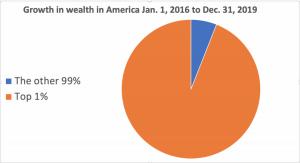Posted by: Francis Koster Published: November 1, 2020
How happy are you, really, as an American?
We can look at the state of our nation through two lenses – The state of our economy, and the state of our happiness.
The United States has the #1 ranked economy in the world.[1] Turns out this does not have much to do with our state of happiness.

For almost a decade, researchers have been studying annually the happiness of 156 countries, looking at citizen’s perceptions of their happiness in many areas including their sense of freedom, their economy, education, the ability to improve oneself, healthcare, life expectancy, and lack of public corruption. Using these indicators, our United States ranked only 18th for happiness. [2] Among all the countries in the world, we rank number 35 for life expectancy and falling. [3] Even among just the richest countries in the world, our life expectancy ranks 12th in the world and is falling.[4]
It does not matter you live in a rich or poor country, the state of the stock market or the GDP in that country does not make you live a longer or happier life.
So here we are ranked highest for our economic activity, and #18 for our happiness. How can politicians who brag about economic progress miss the disconnect to the happiness rankings? Once you better understand the two main indicators used to create economic rankings, things get clearer.
The first indicator is Gross Domestic Product (GDP). Basically, GDP has two main flaws. First, it only counts money changing hands – not what it was spent on, or how much happiness it bought. In an astonishing number of economic activities, GDP rises when the quality of life and happiness goes down. Sell lots of cigarettes and GDP goes up. Make billions by doing things that cause climate change, pollution, birth defects, and unhealthy foods and GDP goes up. Happiness goes down.
GDP also fails to recognize inequality, including the enormous amount of unpaid labor done by (mostly) women. Go out to a restaurant, GDP rises. Eat a mom cooked meal at home, it does not. In 1975, the women of Iceland got pretty upset by how uneven pay was between men and women doing the same job. They went on strike all across the country.[5] Gender fairness reforms were started and their GDP rose in part because of the increase in woman’s wages.[6] Iceland now ranks number 4 on the world happiness index.
The second major indicator of “success” is that “the stock market is setting new records.” Who is this benefiting? According to the Federal Reserve, over the past 4 years, the richest 1% of Americans saw their total stock holdings go up from 10 trillion dollars total to 15 trillion dollars (before Covid-19 hit) – a 50% increase.[7] (This is five million checks each worth a million dollars). Each one of the households in the top 1% richest in America increased their wealth by over four million dollars.[8]
The next rung down the ladder, the wealthiest 10% of all households (which own a lot of stock) saw their stock value grew by over a quarter of a million dollars per household. [9]
On the other hand, the bottom half of all the households in America saw their stock market holdings gain $467.[10]
In our recent national dialog, we have not been talking about the fact that very few people have gained an enormous amount of money recently, and the vast majority have not, or the fact that we only ranking 18th in the world’s ranking of happiness.
It is hard to be happy when one in five North Carolina children live below the poverty level.[11] That means their parents have $530 per month to pay rent, buy food, buy clothing, pay medical bills, and cover transportation costs for that one child.[12] The lifelong effects of poverty on children are catastrophic. They have more obesity and asthma, are seven times more likely to drop out of school, and are at higher risk for emotional problems.[13],[14], [15] T
I want to be clear. I am not a socialist. I do not favor the government running what are now private businesses. I also do not want one in five of our kids growing up under circumstances that harm them for life. Other countries have addressed this by restructuring tax codes and regulations, and as a result, have a much higher happiness score.
To quote our Declaration of Independence: “We hold these truths to be self-evident, that all men are created equal, that they are endowed by their Creator with certain unalienable Rights, that among these are Life, Liberty and the pursuit of Happiness.”
The big issue here is not that we cannot fix this. It is that we are not talking about fixing it.
Authored by Francis Koster Ed. D.
Using numbers from the URL above, (15 Trillion at year end 2019 – 10 Trillion at beginning of 2016 = 5 Trillion divided by (1% of 128,580,000 total households = 1,285,800) = $4,114,000.
The number was determined by subtracting the values for the top 10% at the beginning of 2016 from the values at the end of 2019 found in the chart in the URL following this sentence (10.37-6.92 = 3.4 trillion) and dividing that by 10% of the number of households in the United States (128.58 million /10 = $264,427
The number was determined by subtracting the values for the bottom 50% at the beginning of 2016 from the values at the end of 2019 found in the chart in the URL following this sentence (1.7 -1.4 = .03 trillion -6.92 = .03 trillion) and dividing that by half of the number of households in the United States (128.58 million /64.290,000 = $467.00